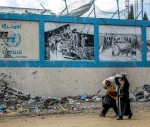You are here
Jordan Strategy Forum paper strategises over coronavirus policy
By JT - Apr 01,2020 - Last updated at Apr 01,2020
AMMAN — The Jordan Strategy Forum (JSF) on Wednesday published a paper titled, “Policies on dealing with coronavirus in Jordan: alternatives and future steps,” which sheds light on the way the Kingdom dealt with and managed the crisis in the short-term and preventive measures it can take in the future.
The paper, prepared by a group of doctors and public health experts, presents a set of recommendations to help support the government in dealing with the virus, according to a press release shared by the forum.
Dealing with the virus requires a mix of policies aimed at preventing the spread of the disease by reducing social interaction rates among the population, and tracking infected people to isolate and treat them and prevent transmitting the disease to others, according to the paper.
The paper also suggests controlling the disease requires boosting the efficiency of epidemiologic field investigations.
Thus, the research said that the policies depend on four main pillars:
- Social health awareness, focusing on people’s knowledge of how the virus is transmitted and how to stay clean and implement social distancing
- The efficiency of epidemiologic investigation, which lies in the government’s ability to conduct medical tests to the largest possible number and reaching the biggest areas of infection and interaction
- Medical intervention for cases that caught the novel coronavirus and their treatment, providing a health infrastructure that enables doctors and sector workers to deal with the infected
- The government’s non-medical measures to prevent the spread through reducing social interactions to stop the transmission of the disease completely and reduce the number of cases to zero
The JSF said that implementing such strict measures is costly, but the spread of the virus would lead to a health crisis with negative social and economic repercussions, which require controlling the spread to enable the economy to preserve the continuity of certain activities, mitigating later financial impacts, which might require a way of life that will last for a long period of time until an ultimate cure is found.
The recommendations, therefore, include forming sub-committees stemming from the main health committees supervising the coronavirus file, comprising experts of pandemics and public health who can read data and the situation to order to support the main committees with necessary recommendations to manage the crisis.
The JSF also recommended boosting public-private sector partnerships to deal with the crisis, especially in regards to field investigations, treatment and awareness campaigns, in addition to on going discussions to utilise private sector capabilities amidst the crisis.
It is important for experts from the Health Ministry, universities and other entities to collect data, as even raw data can help create a deeper understanding of the coronavirus crisis in Jordan, which preserves the privacy of those infected and follows implemented protocols, the paper suggested.
On social awareness, the paper suggested driving public behaviour, as much as possible, towards social distancing practices, reducing crowding and limiting social gatherings, including weddings and funerals, in addition to working on the legal structure of remote work and legislations governing e-commerce and public and private e-services.
In regards to field investigations, the research suggested testing a sample that represents the society to understand the true impact of the crisis and formulate a strategy to combat the virus based on it, also utilising technology to track those infected and those who interacted with them and to track their medical records.
The paper highlights the importance of designating available resources, including intensive care units and assisted ventilation devices to treat patients with critical conditions, publishing guidelines on best practices for workers in the health sector to protect and support them, in addition to sharing those guidelines on all health-related websites and social media pages.
The last recommendation focused on the importance of preparing for gradually going back to normal life as soon as possible under the condition of stabilising the number of cases and not witnessing an increase in daily registered cases, while keeping personal hygiene practices and epidemiologic investigations on going.
Related Articles
AMMAN — Prime Minister Omar Razzaz on Thursday directed the team tasked with following up on the new coronavirus to secure a “new, decent” q
AMMAN — A group of researchers from the University of Jordan has published a study to support epidemiological inspection teams in predicting
AMMAN — Two new cases of Middle East Respiratory Syndrome (MERS) coronavirus-related infection have been registered in Jordan, raising the n

















